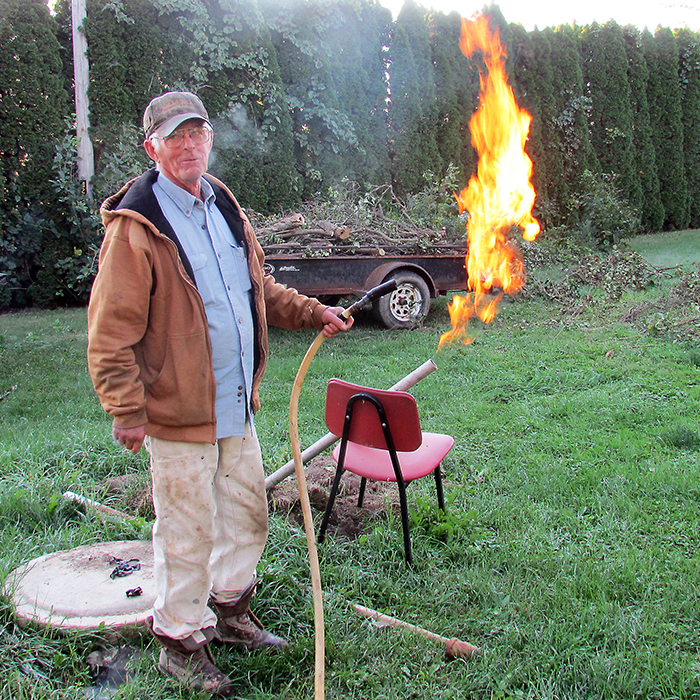
Wade said concerns about methane affecting water quality are misleading.
Not being pro-active in protecting the aquifer in North Kent could cost the municipality tens of millions of dollars, according to the former spokesman for the Water Wells First group.
Kevin Jakubec, who stepped aside from the group while he is an appellant in next month’s Environmental Review Tribunal into the North Kent 1 wind project, said it’s time the municipality took a deeper look into the issue.
“We can no longer say we don’t know what’s happened in Dover with well water quality,” he said. “With North Kent 1, Otter Creek and North Kent 2, there is a real possibility the municipality will end up supplying piped in municipal water to rural areas. The cost of that will far outstrip the money Chatham-Kent is getting from the wind companies.”
He said the municipality’s stated position in the past that it will defer to provincial regulations is an abdication of its responsibility to protect local residents.
“The regulations are the problem,” he said. “Regulation 35909 allows turbine companies to use a desktop model to determine the suitability of an area for turbine construction. We need the aquifer characterized – it requires field work by hydrological engineers.”
He said the municipality could carry out the work on its own in a matter of a couple of months and has ample funds provided through wind farm taxes.
A motion by Chatham Counc. Michael Bondy last month for a moratorium on turbine development pending more testing failed to gather the two-thirds support for discussion.
A subsequent motion by Wallaceburg Counc.
Jeff Wesley to have the municipality seek full party status at the hearing was approved.
Chief Legal Officer for the municipality John Norton said at the time, although Chatham-Kent supports the construction of wind turbines in the community, it must maintain objectivity at the hearing.
“Our position is that we are in support of industrial turbines being built in Chatham-Kent,” said Norton. “At the same time we are concerned if our citizens are coming forward and making it known that there’s been damage caused to water wells because of turbine construction and vibrations.”
So far there has been no actual evidence that the wind turbines are linked to damages specific to Chatham-Kent.
Jakubec said it’s not the time for the mayor to rest on his past record but instead to “step up to the plate and show leadership.”
“There is no reason other than willful ignorance to allow these projects to proceed without doing everything we can to mitigate any problems caused by vibration,” he said.
The issue of vibration will be a key one at the tribunal that came about after the provincial Ministry of the Environment and Climate Change imposed a temporary halt to the North Kent Wind project after Jakubec filed his appeal.
A public meeting in August drew several hundred people to Country View Golf Course where residents told of paying thousands of dollars for filtration systems to try and control silt in wells near turbines.
Ken Wade, a local well driller for the past thirty-plus years, said residents shouldn’t be mislead by reports of methane in wells as a reason to extend pipelines.
He said it isn’t uncommon to find methane in local wells and it doesn’t affect water quality.
“You just need to vent it properly and you have no problem at all,” he said.
To prove his point, he lit vented methane coming out of a well he was restoring, showing a flame in excess of four feet in height while a nearby hose pumped out clear well water.
Wade said there are wells in the former Dover Twp. that have been producing water for a century.
“Unless there’s some disturbance in the aquifer or a problem with a well casing, they can last 100 years,” he said. “It’s clean and cheap and I prefer it to treated city water.”
As far as vibration and other factors affecting turbidity, he said there is precedent.
“There are lots of Dover residents who will tell you their well water is dirty after a big thunderstorm,” he said. “Thunder causes vibrations and after a couple of days thing settle down. With turbines, things never settle down.”
Jakubec said he welcomes claims that the municipality will be using science in determining its opinion on whether water quality is being affected.
“We have the science on our side,” he said. “We need in-depth science, not drive by or desk top science.”
He said the consequences of government mismanagement of utilities are obvious to anyone who pays an electricity bill.
“We are at a crossroads and it will take an open mind by council to do the right thing and not kick this issue down the road,” he said.
Dave Lusk, a resident of the former Chatham Twp. who said his property is “next in line” said Water Wells First is the only group looking out for the community.
“If they have to put in water lines, who’s going to pay? Everyone will have to. You aren’t going to be able to expect rural homeowners to pay millions to get a line down their road or $50,000 to hook up to it.”
Lusk said the group is still trying to raise about $40,000 of the estimated quarter of a million it needs for tribunal costs.






